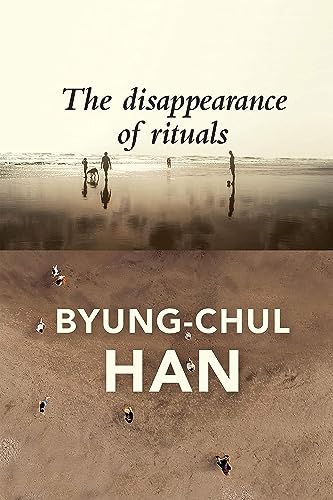The Disappearance of Rituals
A Topology of the Present
Byung-Chul Han
BOOK REVIEW

In a world teetering on the edge of chaotic modernity, The Disappearance of Rituals: A Topology of the Present by Byung-Chul Han invites you to plunge deep into the chasm of our ceaseless routines and the haunting absence of meaningful rituals that once stitched the very fabric of society together. This is not merely a book; it is a wake-up call to the spirit, an urgent plea for reflection amidst an era relentlessly rushing forward, dissolving all in its path.
Han, a luminary of contemporary philosophy, thrusts us into the labyrinth of modern existence where technology drowns out the whispers of our ancestors. His prose cuts sharper than a surgeon's knife, dissecting the role of rituals that have mysteriously vanished from our lives, leaving behind a vacuum filled with the noise of productivity and instantaneous gratification. Each page is a visceral exploration that forces you to confront an unsettling reality: our lives are overshadowed by performance and output, and in chasing the elusive specter of efficiency, we forsake the deeper connections that rituals have historically provided.
As you navigate through the ethereal landscape Han constructs, you will find yourself grappling with profound questions. What are we without the rituals that ground us? What is the cost of living in a world stripped of communal practices that once fostered a sense of belonging and identity? With each chapter, Han meticulously constructs a case that reveals our collective amnesia, igniting a fire of urgency within you to reclaim these lost practices before they slip into the abyss of forgetfulness.
Critics and readers alike have been both enthralled and provoked by Han's audacious arguments. Some resonate with his portrayal of the modern self, fretting over our societal obsession with individualism and competition. These echoes of discontent challenge us to unearth our own rituals, to resurrect those moments of shared silence, joy, and reflection that once tied us to one another. Others, however, question Han's stark critique, arguing that he paints with too broad a brush. Some find comfort in modernity's relentless pace, believing that adaptation and flexibility are the ultimate testaments to human resilience. Nonetheless, these contentious reactions are what make his writing more than mere diatribe; it's a catalyst for discourse that compels readers to engage with their surroundings critically.
Amidst the philosophical rigor, what stands out profoundly is Han's declaration of the "topology of the present." He elucidates how our historical context-marked by globalization and technology's vicissitudes-shapes our consciousness today. This context is vital; it's where the past collides violently with the present, forming the battleground on which our identities are contested. The absence of rituals leaves us alien, adrift in a sea of digital noise, craving depth where we instead find superficiality.
In this exhilarating and eerie examination, Han does not shy away from pointing out the societal structures that propagate this loss. The cult of productivity reigns supreme, a tyrant ruling over our lives with an iron fist, making us but pawns in a game where worth is calculated by output rather than presence. The resultant existential void breeds anxiety, isolation, and a longing for the very rituals we've cast aside. With fervor, Han beckons you to reclaim the comfort of rituals-be it in the simplicity of a shared meal, a familial gathering, or a serene act of remembrance-to ground yourself amid the turmoil.
What truly resonates in The Disappearance of Rituals is Han's unwavering commitment to sparking a renaissance of awareness. His work is more than just philosophical discourse; it is a manifesto for connection, a rallying cry for those weary of the mundane to reconnect with meaning. You will feel the pulse of urgency in his words, as if each sentence were a siren urging you to awaken.
This is not merely an intellectual exercise-it's a visceral invitation to change the narrative of your life. As you close the last page, the echoes of Han's insights linger, challenging you to confront the question: How can you weave rituals back into the tapestry of your existence? This question is a challenge, a call to action, resonating long after you've turned the final page.
In the frenetic blur of our daily lives, the haunting theme of loss permeates our interactions. Byung-Chul Han's work will compel you to face an uncomfortable truth. Each encounter, every missed opportunity to reconnect, beams like a warning siren that urges you to reclaim the richness of ritual before it fades forever. Your response to this loss could redefine your connection to the world-an awakening to purpose, community, and the sublime power of the human experience. 🌌
📖 The Disappearance of Rituals: A Topology of the Present
✍ by Byung-Chul Han
🧾 186 pages
2020
#disappearance #rituals #topology #present #byung #chul #ByungChulHan